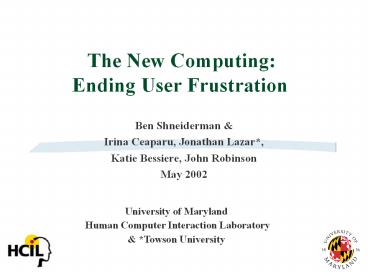The New Computing: Ending User Frustration - PowerPoint PPT Presentation
1 / 22
Title:
The New Computing: Ending User Frustration
Description:
The New Computing: Ending User Frustration – PowerPoint PPT presentation
Number of Views:66
Avg rating:3.0/5.0
Title: The New Computing: Ending User Frustration
1
The New Computing Ending User Frustration
- Ben Shneiderman
- Irina Ceaparu, Jonathan Lazar,
- Katie Bessiere, John Robinson
- May 2002
University of Maryland Human Computer
Interaction Laboratory Towson University
2
A Systematic Approach to Change
The old computing is about what computers can
do, The New Computing is about what people can
do
www.cs.umd.edu/hcil/newcomputing
3
An Inspirational Muse Leonardo da Vinci
(1452-1519)
- Renaissance Man
- Combined science art
- Integrated engineering esthetics
- Balanced technology advancement human
values - Merged visionary practical
4
Leonardos Laptop
- HCIL Symposium
- paying attendees will
- receive a copy around
- September 15.
- MIT Press
- October 2002
5
Goals for The New Computing
- 1) Usable Reliable comprehensible
- 2) Universal Diverse users varied
equipment - 3) Useful In harmony with
human needs
6
1) Usable Ending User Frustration
- Goal - make computer usage less frustrating
- Identify top ten frustrations
- Measure severity frequency in lost time
- Determine if the situation is improving
- Related areas
- Errors
- Time delays
- Emotional reactions
7
1) Frequent frustrating experiences
Networking Web
8
Application System Crashes
1) Frequent frustrating experiences
9
1) Time diary study
- Self reports observations (64 UMD 47 Towson)
- Pre-session survey
- demographic information
- computer experience and attitudes
- level of computer anxiety, mood
- Users spent 1 hour report their frustrating
experiences - Post-session survey
- assess mood after the session
- overall frustration level
- loss of time
- Florida Institute of Technology
(e3.se.fit.edu5335/ufs)
10
(No Transcript)
11
1) Results
UMD Towson
- Frustrating experiences 228 145
- Top problem sources
- web browsing
- system (OS)
- word processing
- other internet use
- video/audio software
- chat and instant messaging
- Top 3 approaches
- knew how to solve
- unable to solve
- figured out
- file browsers
- programming tools
- spreadsheet programs
- graphic design programs
- presentation software
- database programs
- hardware
- Bottom 3 approaches
- consulted manual/book
- consulted online help
- restarted the program
12
1) Results
13
1) Minutes lost UMD Towson
Total minutes 9485
Total minutes lost 4250
568
UMD
902
877
7968
3652
1513
294
Towson
353
14
1) Next Steps
- Validate results with other users
- professional
- elderly
- novice
- Develop more precise monitoring software e.g.
www.bugtoaster.com - Explore ways to improve
- Online help help desks
- Customer service online communities
- Education training
- Software interface re-design
15
- 2) Universal Digital Divide Remains Troubling
Percent of Internet Use by Educational Attainment
U.S. Department of Commerce, www.ntia.doc.gov/n
tiahome/dn/
16
2) Universal Usability in Practice
www.otal.umd.edu/uupractice/
17
3) Useful Generative Theories
Predictive explanatory theories are useful, but
the big step forward will be ?
generative theories Theories of human needs to
guide our invention of new technologies
18
3) Theories of Human Needs
- Jefferson Life, Liberty the Pursuit of
Happiness - Roosevelt Freedom of speech expression,
religion, from want, from fear - Maslow Hierarchy of human needs
- Physiological
- Safety
- Love
- Esteem
- Self-Actualization
- Covey Living, Loving, Learning Leaving a
legacy
19
3) Human Needs for Relationships
- Relationships
- Self
- (working on your own)
- Family Friends
- (2-50 close intimates)
- Colleagues Neighbors
- (50-5000 regular encounters)
- Citizens Markets
- (5000 and more)
20
3) Human Needs for Activities
- Activities
- Collect Information
- Relate Communication
- Create Innovation
- Donate Dissemination
21
3) Activities and Relationship Table (ART)
Activities Collect Relate Create
Donate
- Relationships
- Self
- Family Friends
- Colleagues Neighbors
- Citizenry Markets
22
3) Future Directions
- E-learning The new education
- E-business The new commerce
- E-healthcare The new medicine
- E-government The new politics
- Mega-creativity
- Grander Goals The Next Leonardo
www.cs.umd.edu/hcil/newcomputing































